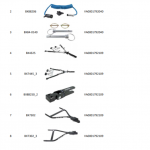Allegedly Defamatory Tweet About Non-Resident Insufficient to Confer Jurisdiction
This is a lawsuit for defamation brought by Jason Miller. The particular claims in question arise out of a tweet. Miller was an advisor on the Trump campaign and later became a commentator and consultant. He was allegedly involved in…
Eleventh Lawsuit Against Social Media Providers for “Materially Supporting Terrorists” Fails–Palmucci v. Twitter
This case is before the same district court judge who handled Fields v. Twitter and Copeland v. Twitter. It involves the 2015 terrorist attack in Paris, but “[t]here are no allegations in the AC that Abaaoud, Laachraoui, or any of the…

Copyright Lawsuits Over Product Shots Are Stupid–eTrailer v. Automatic Equipment
The plaintiff is a retailer of “motor vehicle accessories.” The defendant manufactures towing supplies and has previously distributed its goods to the plaintiff. The plaintiff created product shots and obtained copyright registrations for some of them. On the right is…

Another Government Impermissibly Censors Constituents on Facebook–Robinson v. Hunt County
This lawsuit alleges censorship by the administrators of the Hunt County Sheriff’s Office Facebook page. The Facebook page invited “input and POSITIVE comments regarding the Hunt County Sheriff’s Office.” The page was intended to discuss “matters of public interest,” but…
Another Appellate Court Rejects “Material Support for Terrorist” Claims Against Social Media Platforms–Crosby v. Twitter
This suit involves the Pulse Nightclub shooting in Orlando, Florida. The shooter Mateen claims to have self-radicalized by consuming terrorist content on social media. After the shooting, ISIS claimed responsibility. The plaintiffs didn’t sue Mateen or ISIS but instead sued…
Section 230 Applies to ADA Closed Captioning Claims–National Federation of the Deaf v. Harvard
Harvard publishes a lot of video online, both on servers it operates and through third-party services like YouTube. Only some of that video has “timely, accurate closed captioning.” The National Federation of the Deaf sued Harvard for ADA violations and…
An Email Inbox Isn’t a “Place” for Purposes of Florida Privacy Law–Hall v. Sargeant
One of the most venerable cyberlaw questions: is cyberspace a physical place, and does it matter legally? For purposes of Florida’s privacy invasion law, a federal district court answers: no and yes. This case involves long-running litigation and drama between…
Recap of the Copyright Office’s Section 512 Study Roundtable
On Monday, I participated in a Copyright Office roundtable regarding their long-delayed report on Section 512. The roundtable was intended to update the study’s record from 2017, when progress stalled on the report. Thus, the topic nominally was to discuss…
Court Says California’s Anti-Spam Statute Doesn’t Regulate Affiliate Networks–Bank v. Hydra
This judgment followed a bench trial in a case over three unwanted email messages. The case was originally filed in 2010! The plaintiff is a lawyer suing pro se. The defendant is Hydra Group, which operated an affiliate network. The…
How Have Section 512(f) Cases Fared Since 2017? (Spoiler: Not Well)
On Monday, I’m participating in a Copyright Office workshop on Section 512. The workshop supports the Copyright Office’s long-pending Section 512 report, which started in 2015 but stalled out in 2017. To freshen up the project, the workshop will cover…
